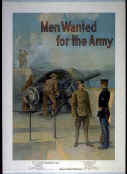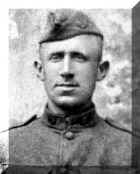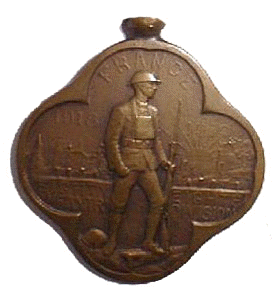|

Welcome to my Great War Homepage.
It is not my intention to even try to tell the entire story of World War 1,
but to provide the visitor with an overview of the 88th division's role in this terrible
conflict which cost the American Expeditionary Force battle casualties totaling 240,197 (
men killed, wounded , missing in action and prisoners). A war which brought hardship suffering and
pain. With the advent of mustard gas, speedy German tanks, and the machine gun, war was
changed forever. Instead of the thousands of deaths that had resulted from past wars, The
Great War claimed the lives of over 8,300,000 soldiers, and almost as many civilians. Over
19 million men, women, and children from all the nations were wounded, and some countries
had over 40 percent of those that they sent into the field, never return.
The 88th Division, a National Army Division was
organized September 4, 1917, at Camp Dodge, Iowa, from men drafted from the states of
Minnesota, Iowa, the Dakotas, Illinois and later men from Missouri and Nebraska. This site
will contain the entire roster of every officer and man who served with the 88th Division
in the A.E.F. In addition, it will list the troopships that transported the division to
France, photographs, battles, and general history of the Division.
  
BRIEF HISTORY OF THE
88TH DIVISION
The 88th Division, a National Army Division, was
organized September 4, 1917, at Camp Dodge, Iowa, from men drafted from the states of
Minnesota, Iowa. the Dakotas and Illinois. Later when these first drafts had been
transferred in large measure to Camps Cody, Bowie, Doniphan, Pike, Travis and Gordon,
newly drafted men from these original states, together with men from Missouri and
Nebraska, constituted the bulk of the Division. The Division was officered largely by
reserve officers from the First Training Camp at Fort Snelling, Minnesota, and from the
Second Training Camps at Forts Sheridan, Snelling and Benjamin Harrison.
July 25, 1918, to
Sep/ember 4,1918
July 25, 1918, the Division began moving from
Camp Dodge overseas, an(l was assembled in the 21st Training Area with headquarters at
Semur, Cote dOr, France, less the 163d Artillery Brigade, which was sent to the artillery
training school at Clermont Ferrand in the south of France and never rejoined the
Division.
September 5, 1918, to
September 13, 1918
On September 5, 1918, Major-General William
Weigel, who had just been promoted from Brigadier General in command of the 56th Infantry
Brigade of the 28th Division, U. S. A., which had taken part in the Second Maine
offensive, was assigned as Commander of the 88th Division. The Division was assigned to
the VI American Corps, First Army, for training in open warfare.
September 14, 1918, to September 27, 1918 September 14, 1918, to September 27, 1918, 1918
September 14, 1918, the Division moved by rail to
the Hericourt, Haute-Saone Training Area near Belfort, France. Its position in support
enabled the 29th American Division to be withdrawn from the Center Sector of Hante-Alsace
and sent to take a prominent part in the Meuse-Argonne offensive, where, crossing the
river Meuse at Samogneux, it advanced to the high ground east of Consenvoye and captured
the enemy artillery observation points and massed artillery there. This maneuver enabled
the American divisions west of the Meuse River to advance without having their right flank
held up by artillery fire from these heights. Thus, by releasing the 29th Division from
the Haute-Alsace Sector, the 88th Division contributed, not indirectly, to the winning of
the important Meuse-Argonne offensive. On leaving the 21st Training Area at Semur, Cote
d’Or on September 14, 1918, the 88th Division was transferred to the VII American
Army Corps (with headquarters at Remiremont) for administrative purposes.
September 23, 1918, to
Norember 1, 1918
On September 23, 1918, advanced elements of the
88th Division moved into the Center Sector of Haute-Alsace, which was being temporarily
held hy the 38th French Division that had relieved the 29th American Division. These
advanced elements, totaling eight officers and four hundred men, were augmented until on
October 7, 1918,
Division Headquarters of the 88th Division was moved to Montreaux Chateau, Haute-Alsace;
and on October 15, 1918, the command of the Center Sector of Haute-Alsace passed from the
38th French Division to the 88th American Division,
which formed part of the 40th French Army
Corps of the VII French Army, while remaining under the VII American Army Corps for
administrative purposes. To reach the sector, the infantry and engineers of the Division
had been forced to make long marches—sometimes 25 kilometers a day—on congested
roads, pulling with them their heavily loaded machine gun carts, combat and field wagons,
in cases the average weight pulled per man being 250 pounds. Furthermore, the Division had
been forced to go without essential supplies, hecause all available transportation was
being used to the maximum in the Argonne (Irive. On arrival in France, the Division had
been required to turn in all its field ranges, overcoats, and all except one blanket per
man; and means of cooking had to be improvised, or secured by purchase from the French or
by the utilization of small French stoves in billets, supplemented by the extensive use of
camp kettles and watercans. Until October 6, 1918, there were only two ambulances in the
Division— and they had to serve the French troops in the area also. Meantime, on
September 20. 1918, a wide-spread epidemic of influenza set in, and in eight days there
were 1,370 cases in one regiment alone. This epidemic increased until October 14, 1918, on
which date there were eighty deaths. All told there were 6,815 cases of influenza and
1,041 cases of pneumonia reported, from which 11.1 deaths resulted. After arrival in
sector, much additional marching was made necessary by reason of the withdrawal of French
divisions and the re-arrangement of their forces on the north and south of the Center
Sector of Haute-Alsace. On October 24, 1918, the Division took over the Fulleren
subsector, of the South Sector of Haute-Alsace, making a total of approximately nineteen
kilometers of front line held by the 88th Division. While in this (Haute-Alsace) sector,
energetic patrolling, often in force, in connection with the French division in the sector
and later when the 88th American Division alone occupied the sector, kept the enemy
constantly on the alert, held in the south many German planes, considerable artillery, and
several divisions which had remained in this sector of the German line for a long time.
All this force, consequently, was held out of the Meuse-Argonne offensive, and again the
88th Division contributed, less indirectly, to the success of that offensive. In this
(Haute-Alsace) sector, several night raids were carried out by the 88th Division and a
number of prisoners were captured, enabling the identification of the opposing divisions
to be kept up-to-date. German "stormstruppen" troops, assigned to the duty of
roving, from one sector to another between the Voges and the Swiss Border, also made
several raids on the lines of the 88th Division, both at night and in the daytime. These
enemy raids were accompanied by gas projector attacks and by intense artillery
bombardments, but at no time were the German raiding parties able to enter the lines held
by the Division. On November 2, 1918, the 88th Division began to withdraw from the
HauteAlsace sector, and on November 4, 1918, turned over command of the sector to the
154th French Division; 88th Division headquarters being established temporarily on the
outskirts of Belfort.
November 2, 1918,
to November 11, 1918 November 2, 1918,
to November 11, 1918 1918,
to November 11, 1918 November 2, 1918,
to November 11, 1918
2, 1918,
to November 11, 1918
Meanwhile, on November 1, 1918, the 88th American
Division was transferred to the Second American Army (with headquarters at Toul, and on
Nov ember 6, 1918, began moving the advance brigade to the Lagney Area, north of Toul,
where it was placed in the IV Army Corps (American) Reserve, which corps had headquarters
at Wienville, preparatory to taking active part in the Meuse-Argonne offensive. The
balance of the Division was placed in Second American Army Reserve, with 88th Division
Headquarters at Lagney. Again, the presence of the 88th Division, this time on the
Meuse-Argonne front, made possible during the days immediately preceding the armistice the
delivery up to the very hour of the armistice of even more powerful blows by other
elements of American divisions released by the arrival of the 88th Division in Corps
Reserve. The plans of the Second Army for the contemplated attack east of the Mozelle
River, effective November 14, 1918, and which was to strike the German line between METZ
and SARREBRUCK, provided for the 88th Division an important part in what could have been a
very important phase of the Metz coup. The signing of the armistice on November 11, 1918,
stopped this new offensive - and effectively put an end to the fighting.
The achievements of the 88th Division have been
measured only by its opportunities.

This site was designed using Microsoft FrontPage '98. Some
enhancements such as the 'sound files' may work only if using Microsoft Internet Explorer
version 4.x or higher.


Last updated: 03/06/03
Last updated: 03/06/03
Webmaster: Rich2493@mchsi.com

 Camp Dodge photos
88th Division photos (350th Band & Major Russ) Camp Dodge photos
88th Division photos (350th Band & Major Russ)
Be sure and check out my Fire Department site!
http://historian.freeservers.com/index.htm
My Naval Air Web Page. http://utron1.itgo.com
Any use of copyrighted material is totally unintentional, and any
such material will be immediately removed from this site upon notification from the
copyright holder.
|